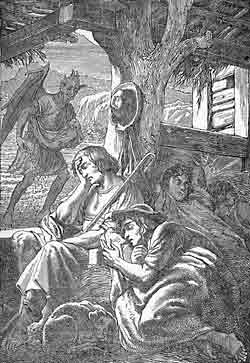 VISIT TO THE PONTIFICAL INSTITUTE FOR SACRED MUSIC
VISIT TO THE PONTIFICAL INSTITUTE FOR SACRED MUSIC ADDRESS OF HIS HOLINESS BENEDICT XVI
Via di Torre Rossa, Rome
Saturday, 13 October 2007
Venerable Brothers in the Episcopate and in the Priesthood,
Dear Professors and Students of the Pontifical Institute for Sacred Music,
On the memorable day of 21 November 1985 my beloved Predecessor, Pope John Paul II, went to visit this "aedes Sancti Hieronymi de Urbe" where, since its foundation by Pope Pius XI in 1932, a privileged community of Benedictine monks has worked enthusiastically on the revision of the Vulgate Bible. It was then that the Pontifical Institute for Sacred Music moved here, complying with the Holy See's wishes, although it retained at its former headquarters in Palazzo dell'Apollinare, the Institute's historic Gregory XIII Hall, the Academic Hall or Aula Magna which still is, so to speak, the "sanctuary" where solemn academic events and concerts are held. The great organ which Madame Justine Ward gave Pius XI in 1932 has now been totally restored with the generous contribution of the Government of the "Generalitat de Catalunya". I am pleased to greet the Representatives of that Government who are present here.
I have come with joy to the didactic centre of the Pontifical Institute for Sacred Music, which has been totally renovated. With my Visit I inaugurate and bless the impressive restoration work carried out in recent years at the initiative of the Holy See with the significant contribution of various benefactors, among whom stand out the "Fondazione Pro Musica e Arte Sacra", which has overseen the total restoration of the Library. My intention is also to inaugurate and bless the restoration work done in the Academic Hall, in which a magnificent piano has been set on the dais next to the above-mentioned great organ. It was a gift from Telecom Italia Mobile to beloved Pope John Paul II for "his" Institute for Sacred Music.
I would now like to express my gratitude to Cardinal Zenon Grocholewski, Prefect of the Congregation for Catholic Education and your Grand Chancellor, for expressing his courteous good wishes to me also on your behalf. On this occasion, I gladly confirm my esteem and pleasure in the work that the Academic Board, gathered closely around the Principal, is carrying out with a sense of responsibility and appreciated professionalism. My greetings go to everyone present: the relatives, with their children, and the friends accompanying them, the officials, staff, students and residents, as well as the representatives of the Consociatio Internationalis Musicae Sacrae and the Foederatio Internationalis Pueri Cantores.
Your Pontifical Institute is rapidly approaching the centenary of its foundation by the Holy Father Pius X, who established with the Brief Expleverunt Desiderii, the "Scuola Superiore di Musica Sacra" in 1911. Later, after subsequent interventions by Benedict XV and Pius XI, with the Apostolic Constitution Deus Scientiarum Dominus, once again promulgated by Pius XI, it became the Pontifical Institute for Sacred Music, and is still today committed actively to fulfilling its original mission at the service of the universal Church. Numerous students who have met here from every region of the world to train in the disciplines of sacred music become in their turn teachers in the respective local Churches. And how many of them there have been in the span of almost a century! I am pleased here to address an affectionate greeting to the man who, one might say, represents with his splendid longevity the "historical memory" of the Institute and personifies so many others who have worked here: the Maestro, Mons. Domenico Bartolucci.
I am pleased in this context to recall what the Second Vatican Council established with regard to sacred music. In line with an age-old tradition, the Council said it "is a treasure of inestimable value, greater even than that of any other art. The main reason for this pre-eminence is that, as a combination of sacred music and words, it forms a necessary or integral part of the solemn liturgy" (Sacrosanctum Concilium, n. 112). How often does the rich biblical and patristic tradition stress the effectiveness of song and sacred music in moving and uplifting hearts to penetrate, so to speak, the intimate depths of God's life itself! Well aware of this, John Paul II observed that today as always, three traits distinguish sacred music: "holiness", "true art" and "universality" or the possibility that it can be proposed to any people or type of assembly (cf. Chirograph Tra le Sollecitudini, 22 November 2003; ORE, 28 January 2004, p. 6). Precisely in view of this, the ecclesiastical Authority must work to guide wisely the development of such a demanding type of music, not "freezing" its treasure but by seeking to integrate the valid innovations of the present into the heritage of the past in order to achieve a synthesis worthy of the lofty mission reserved to it in divine service. I am certain that the Pontifical Institute for Sacred Music, in harmony with the Congregation for Divine Worship, will not fail to make its contribution to "updating" for our times the precious traditions that abound in sacred music.
As I invoke upon you the motherly protection of Our Lady of the Magnificat and the intercession of St Gregory the Great and of St Cecilia, I assure you on my part of a constant remembrance in prayer. As I hope that the new academic year about to begin will be filled with every grace, I cordially impart a special Apostolic Blessing to you all.
© Copyright 2007 - Libreria Editrice Vaticana
Source: http://www.vatican.va/holy_father/benedict_xvi/speeches/2007/october/documents/hf_ben-xvi_spe_20071013_musica-sacra_en.html
 For Nov 11, 2007 which is the 24th Sunday after Pentecost, we are going to sing:
For Nov 11, 2007 which is the 24th Sunday after Pentecost, we are going to sing:





